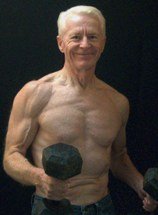


In today's May 15, 2011 newsletter . . .
Losing (fat) Weight and 70/30 RuleYou hear it a lot these days: Achieving normal bodyweight is 70 percent diet and 30 percent exercise. I don’t know if there is actual science to backup the 70/30 ratio, or who came up with such exact percentages, but it would not surprise me at all to learn that it is accurate.Look around the gym or in your exercise class and you’ll see some people who come regularly and put in a decent effort — yet their body shape doesn’t change much. And almost all of the time, it is because they simply eat too much. The cliché that "you can’t out exercise a bad diet" may not be carved in stone, but it should be written in big letters somewhere in every gym. I have heard people say the reason they run or lift weights is so they can eat as much and whatever they want. You’ve probably heard it, too. Well, guess what? I’m sure the exercise is beneficial to them, but they’re never going to be really trim. Oh, maybe you can find a few fast burners that defy the rule. But you sure won’t find many. The vast majority of us must gain control over what and especially how much we put in our mouths, or we are destined to carry too much fat. When I taught cardio kickboxing, I watched the students who came regularly. Everyone’s fitness and endurance improved. But without exception, the ones who really shed the excess fat also cut back on how much they ate. Some went to Weight Watchers or Jenny Craig. Others followed the Zone or various other programs. Some of the programs were balanced and healthy, and some not so healthy, long term. But the common denominator was that whatever program they followed it resulted in their taking in fewer calories. Naturally, I prefer my own way of healthful eating, which I explain here and in more detail in my books. But regardless of what program people follow, to lose weight you must take in fewer calories daily than your body needs to maintain your current weight and stored fat. It is true: You cannot out exercise a bad diet. I don’t know if success is exactly 70 percent diet and 30 percent exercise. But I’d guess the ratio is pretty close. Find my nutrition guidelines here.
A Schwarzenegger LegacyPoor Arnold. Well I probably shouldn’t use the word poor. Financially, I think he must be quite comfortable. No, poor he is not. In other areas, though, he has seen better times. He began as California’s governor with high poll numbers, and was unpopular leaving office. Now we learn of marriage difficulties as well. But remember his famous line from The Terminator: "I’ll be back." I imagine he will.The steroid business aside, a part of his bodybuilding legacy includes a nice upper-body exercise adaptation known as the Arnold Press. It’s a good one and I’ve added something to it that (I think) makes it even better: the dumbbell curl. Take a look. Give it a try. A lot of people like it. Watch a brief demo here: the Arnold Press & Dumbbell Curl Combo
You've probably heard about the tremendous benefits of weight training and how you can retain -- or even reclaim -- the attributes of youth . . . Discover the way with . . . Gray Iron: A Fitness Guide for Senior Men and Women Newsletter Policy The Gray Iron Fitness Newsletter is a free publication sent twice monthly to subscribers. The purpose is to provide honest and realistic fitness information for people age 50 and above. I have never been paid or received compensation of any kind to write a positive review or endorse a product. If I say that I personally use a product or service, it is because I find value in it and have paid for it with my own money. Like newspapers, magazines and television, this newsletter and my web site contain advertising and marketing links. Naturally, I am compensated for these. The newsletter and web site provide information to help users establish and maintain a fitness lifestyle. But fitness information is not the same as fitness advice, which is the application of exercise and dietary practices to an individual's specific circumstances. Therefore, always consult with your physician for assurance that fitness information, and your interpretation of it, is appropriate for you. Your comments and questions are always appreciated. Sincerely, Logan Franklin |